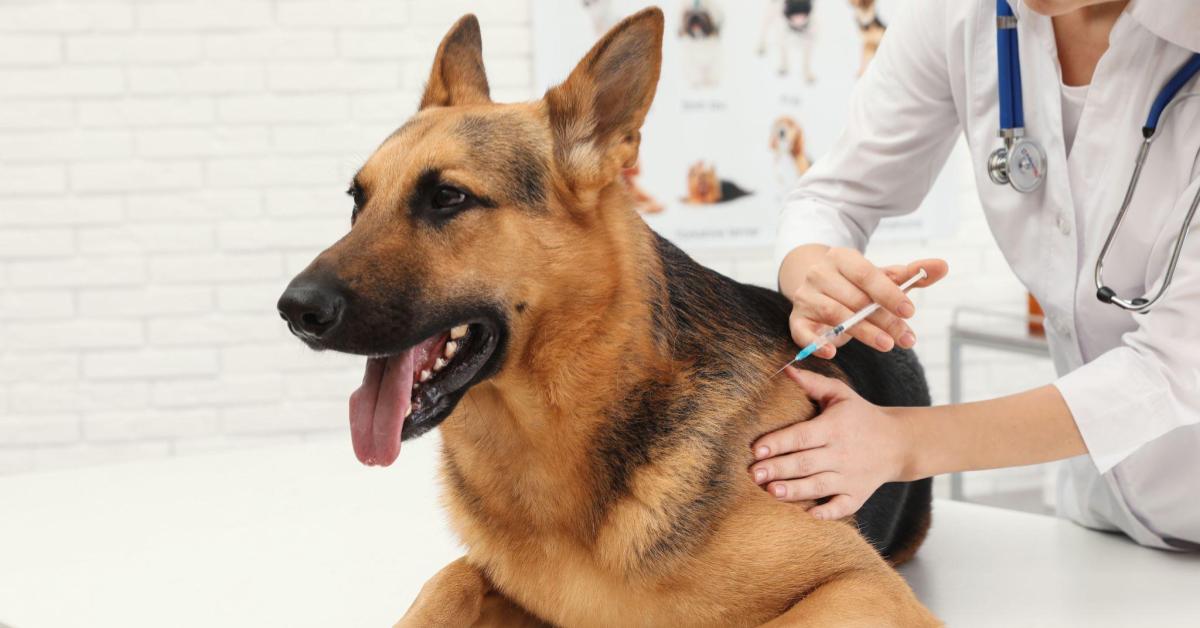Leptospirosis is a contagious bacterial disease. Though leptospirosis occurs all over the world, it’s more common in warm, wet climates and during rainy seasons. All mammals, including dogs, cats, and humans, are susceptible to becoming infected and sick with lepto.
Fortunately, there is a vaccine against leptospirosis that is available for dogs. This article will give readers detailed information on the leptospirosis vaccine: how it works, who it is recommended for, negative side effects, and whether you should consider it for your dog.
What is leptospirosis?
Leptospirosis is a contagious bacterial disease caused by bacteria called leptospira. Animals and people become infected when they come into contact with an infected animal’s urine. You may be thinking that the exposure risk is low, however, most animals become infected after drinking contaminated water or accidentally ingesting soil that has been contaminated by urine from an infected animal.
Outbreaks of lepto are often seen after flooding and hurricanes, as the organism can only survive outside of the body in water. Leptospirosis causes fever, vomiting, diarrhea, malaise, and loss of appetite, and can cause life-threatening liver and kidney damage.
In the recent past, the dogs that were considered at the highest risk for developing lepto were hunting dogs or dogs that spent a lot of time in rural areas. Now, due to urban spread, leptospirosis is commonly seen in dogs that live in urban areas including cities that have wildlife, like squirrels, rodents, deer, and raccoons. Small breed dogs who live in urban areas and are unvaccinated are considered to have the highest risk for lepto.
What is the leptospirosis vaccine for dogs, and how does it work?
The leptospirosis vaccine introduces a dog’s immune system to a small amount of inactivated (dead) bacteria. The immune system then responds by creating antibodies. If the dog is ever exposed to leptospira bacteria, the immune system recognizes the bacteria as foreign invaders and fights the infection quickly and effectively.
There are over 250 documented serovars (subtypes) of leptospira bacteria in the world, however, only a few account for most of the sick dogs in the United States. Therefore, leptospirosis vaccines typically only contain 4 of the most common serovars seen in the U.S., including L. grippotyphosa and L. icterohaemorrhagiae. The vaccine not only reduces your dog’s risk of becoming infected with leptospirosis, but also reduces the severity of clinical signs in infected dogs and reduces shedding the bacteria back into the environment. In addition, the vaccine does offer some cross-protection to other serovars.
The leptospirosis vaccine requires an initial injection followed by a booster 2 weeks later. Afterward, annual boosters are required to keep antibody titers high enough to protect the dog against leptospirosis. Studies have shown that protection from the lepto vaccine only lasts about one year, which is why annual boosters are recommended. To reduce the number of times a dog is poked with a needle, the lepto vaccine has also been combined with the distemper and parvovirus vaccines.
Should I get my dog vaccinated against lepto?
The leptospirosis vaccine is considered a non-core lifestyle vaccine, which means that it isn’t recommended for all dogs. Pet owners should take several risk factors into account when deciding whether to vaccinate your dog against leptospirosis. These include:
● Whether lepto has been documented in your area, or you plan to take your dog to an area where lepto has been documented (don’t know the prevalence of lepto in your area? Ask your vet!)
● Dogs that like to drink from puddles, ponds, lakes, rivers, or streams
● Dogs that live in a rural area
● Dogs that live on a property with other animals
● Dogs that have access to a backyard that has wild animals (rodents, squirrels, opossums, skunks, deer. etc.)
● Dogs that visit dog parks or are in doggie daycare where they interact with other dogs
● Small dogs that live in urban areas
A growing percentage of the patients that are being seen for leptospirosis are purse dogs – Yorkies, Maltese, etc. – that rarely touch the ground when they go outside. If these
dogs can be infected, then any dog can. Considering that the side effects associated with the vaccine are low (more on this below), the emerging risk of infection with leptospirosis spreading into new areas, and the fact that it is a zoonotic disease (which means that people can also be infected), there seem to be more pros to getting the vaccine than cons.
Even though the infection can easily be treated with antibiotics, it is still a good idea to get the vaccine because if your dog does become infected, if they are vaccinated, they will likely have milder symptoms (or no symptoms at all) and not be as sick as a dog that has not been vaccinated against the disease. This vaccine should not be given to pregnant dogs or dogs that are sensitive to amphotericin or gentamycin (used as preservatives in the vaccine).
Are there any negative side effects associated with the lepto vaccine?
In the past, the leptospirosis vaccine anecdotally was associated with a higher incidence of adverse vaccine reactions including vomiting, fever, malaise, and local swelling. These reactions were most seen in smaller dogs, including Dachshund and Chihuahua.
In recent years, the vaccine has undergone a significant refining process to purify and remove ingredients that could be reactionary, and nowadays there is a low incidence of adverse vaccine reactions with the leptospirosis vaccine. The most commonly reported reactions associated with the leptospirosis vaccine include:
● Fever
● Malaise
● Upset stomach, loose stool
● Sensitivity and/or swelling at the injection site
These reactions are fairly common with most vaccines for the first 24-48 hours after vaccination. More serious reactions to vaccines include:
● Above symptoms lasting longer than 48 hours
● Limping
● Vomiting
● Hives
● Difficulty breathing
If these are noticed, contact your veterinarian. If your dog is extra sensitive to vaccinations, consult with your veterinarian on how to make the vaccination process less painful. These can include:
● Splitting up vaccines
● Pretreating your dog with diphenhydramine
● Warm compresses applied to the vaccination site
What does the leptospirosis vaccine cost?
Each injection of leptospirosis vaccine costs anywhere from $25-$45. This does not include the cost of an office visit. You may lower your costs by purchasing wellness plan that covers vaccines. Alternatively, suppose your dog only needs a booster and nothing else. In that case, you can ask your veterinary office for a veterinary technician appointment to get the booster (and not see the doctor) or get your dog vaccinated at a low-cost vaccine clinic.
When considering your dog’s health, it is important to remember to protect them against infectious diseases to the best of your ability. While you can’t always prevent exposure to lepto, you can reduce the likelihood of your dog becoming sick with lepto or spreading the disease by vaccinating your dog.




